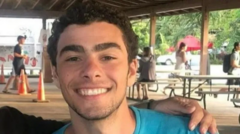In New York City, shortly after the shocking murder of UnitedHealthcare CEO Brian Thompson, a group of young men gathered in Washington Square Park to participate in a lookalike contest for the prime suspect, Luigi Mangione. This bizarre event, mocked by attendees, illustrated a more profound social media frenzy that has surrounded Mangione since the tragic shooting occurred on December 4. Talia Jane, a journalist on the scene, remarked that there was pre-existing animosity towards private health insurers, which this incident intensified.
Following Thompson's death, the internet has controversially embraced Mangione, a seemingly charismatic figure with a striking appearance and ties to a wealthy Baltimore family. This admiration has taken form through TikTok videos, memes, and even fan merchandise, solidifying his image as a folk hero to some. According to Josh Shapiro, the Governor of Pennsylvania, the glorification of violence undercuts the essence of civil society.
From the moment Thompson was shot, social media users, particularly on TikTok, elevated Mangione to cult status, labeling him as the "CEO assassin." Spotify playlists dedicated to him emerged as did hostile reactions towards those perceived to be unjustly targeting him, including the employee who reported his suspicious behavior at a McDonald's.
Much of the admiration for Mangione seems driven by his expression of anger against the healthcare industry. Reports state that he was found with a handwritten note condemning "these parasites," referencing corporate greed. This rhetoric coincided with a surge in social media use of the hashtag #EatTheRich, igniting discussions about wealth inequality and corporate accountability.
Analyzing the online buzz, the Network Contagion Research Institute indicated that while a notable portion of people expressed disdain for healthcare providers, this trend complicates the narrative by fostering approval for violent acts as a means of political expression. Online discussions surrounding the incident often overshadow Thompson's death, with many lamenting the empathy directed at the alleged assailant rather than at the victim.
Experts in digital culture highlight the shift in how society perceives individuals implicated in gruesome crimes, often idolizing their looks and charisma over moral implications. Mangione's appeal illustrates societal tendencies to link physical attractiveness with acceptable behavior, challenging traditional narratives surrounding crime and punishment.
Despite the troubling nature of the support received by Mangione, dissent against the healthcare industry has long existed, as evidenced by protests from individuals like Jenn Coffey, who advocate for systemic change. Coffey, who has faced her own challenges with UnitedHealthcare, expressed remorse that violence has kickstarted the ongoing discussion regarding healthcare reform.
In the shadow of Thompson's death, his integrity and work are arguably eclipsed by a collective focus on societal criticism of healthcare structures. Those who knew him described him as a decent man who contributed positively to the field, reinforcing that efforts to humanize him are often lost in the noise of an angry online mob seeking justice—or a semblance of it—for perceived systemic failures.
With calls for reflection from figures in healthcare, such as Pfizer's chief sustainability officer, the discourse surrounding this incident might catalyze change but also begs questions about the perilous potential of glorifying violence as a form of protest. Under the surface, societal frustrations are brewing, igniting a complex conversation about the U.S. healthcare system that is deeply intertwined with the tragic narratives of those caught in its grasp.




















